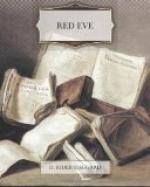Here, then, he and his people lay hid, cursing their fortunes, since, notwithstanding the provisions that they had conveyed thither in secret, the place was icy cold in the bitter, easterly winds which tore over it from the sea. So lonely was it, also, that the Frenchmen swore that their comrades slain by Grey Dick haunted them at nights, bidding them prepare to join the number of the dead. Indeed, had not Acour vowed that he would hang the first man who attempted to desert, some of them would have left him to make the best of their way back to France. For always as they crouched by the smoking hearth they dreamed of Grey Dick and his terrible arrows.
Sir Edmund Acour’s letter came safely into the hands of Eve, brought to her by the Mayor himself. It read thus:
Lady,
You will no more of me, so however much you should live to ask it, I will have no more of you. I go hang your merchant lout, and afterward away to France, who wish to have done with your cold Suffolk, where you may buy my lands cheap if you will. Yet, should Master Hugh de Cressi chance to escape me, I counsel you to marry him, for I can wish you no worse fate, seeing what you will be, than to remember what you might have been. Meanwhile it is my duty as a Christian to tell you, in case you should desire to speak to him ere it be too late, that your father lies at the point of death from a sickness brought on by his grief at the slaying of his son and your cruel desertion of him, and calls for you in his ravings. May God forgive you, as I try to do, all the evil that you have wrought, which, perhaps, is not done with yet. Unless Fate should bring us together again, for as aught I know it may, I bid you farewell forever. Would that I had never seen your face, but well are you named Red Eve, who, like the false Helen in a story you have never heard, were born to bring brave men to their deaths. Again farewell,
De Noyon.
“Who is this Helen?” asked Eve of Sir Andrew when the letter had been read.
“A fair Grecian, daughter, over whom nations fought when the world was young, because of her beauty.”
“Ah, well! she did not make herself beautiful, did she? and, perchance, was more sinned against than sinning, since women, having but one life to live, must follow their own hearts. But this Helen has been dead a long while, so let her rest, if rest she may. And now it seems that Acour is away and that my father lies very sick. What shall I do? Return to him?”
“First I will make sure that the Frenchman has gone, and then we will see, daughter.”
So Sir Andrew sent out messengers who reported it to be true that Acour had ridden straight to London to see the King and then sail for Dover. Also they said that no Frenchmen were left at Blythburgh save those who would never leave the place again, and that Sir John Clavering lay sick in his bed at the manor.




